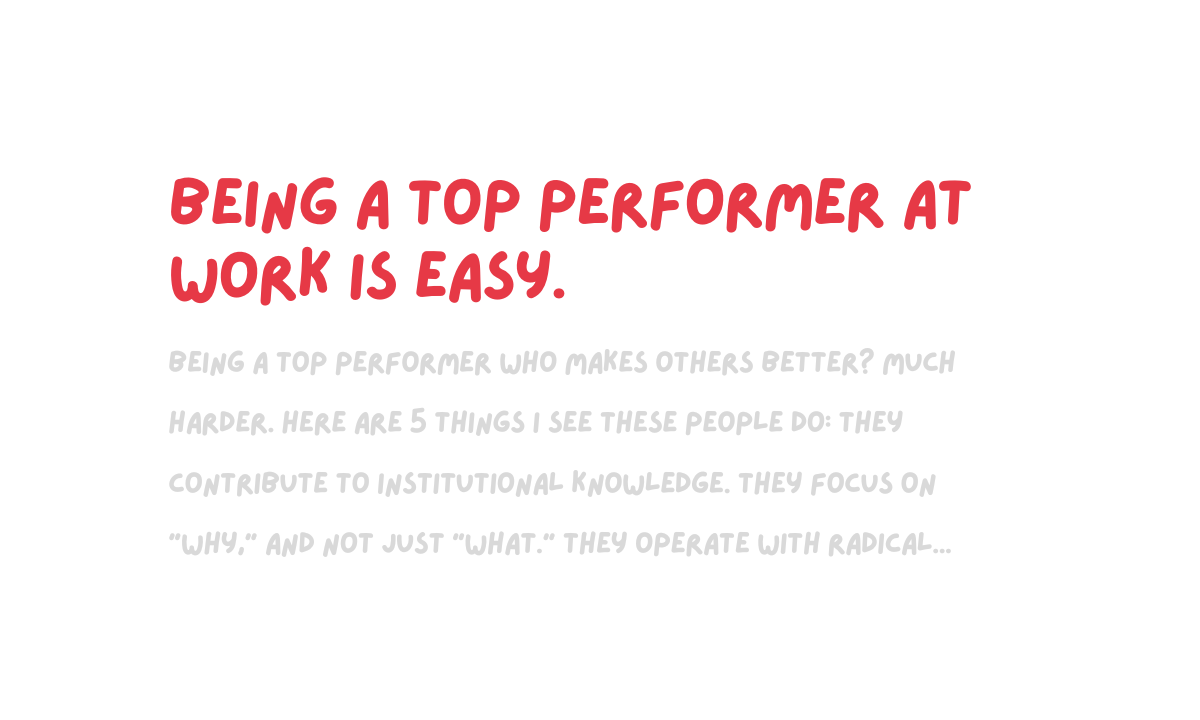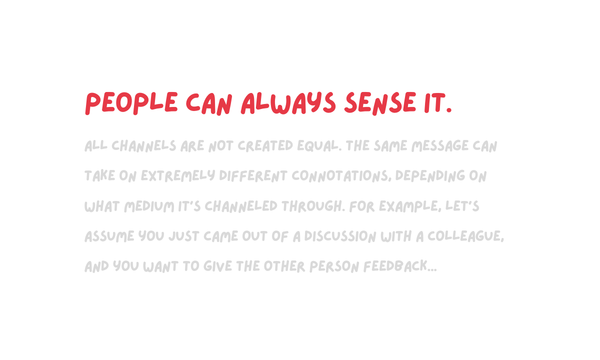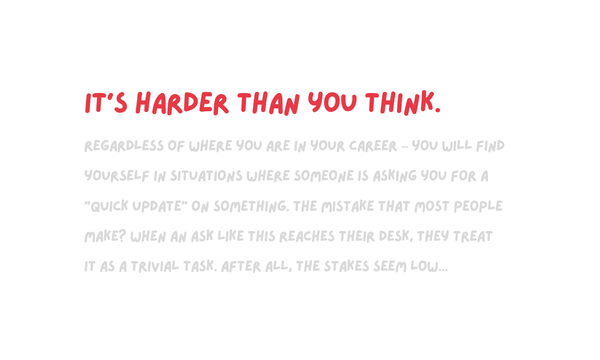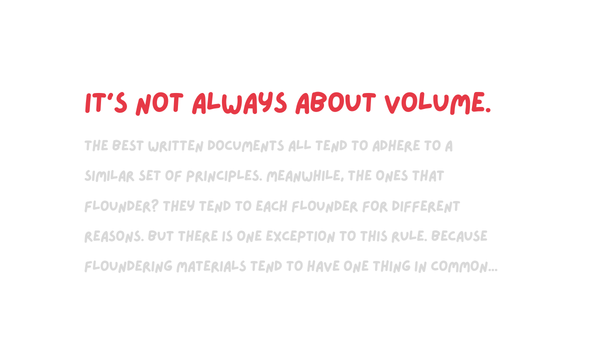How (Some) Top Performers Make Others Better

Being a top performer at work is easy.
Being a top performer who makes others better? Much harder.
But most hiring interviews don't test for that. Most developmental feedback we receive at work isn't centered around it either.
Instead, the spotlight tends to be on how we thrive as individuals. And less about how we enable others around us to thrive.
But the best individual contributors (ICs) I see at Google? They create a wide halo around them. They're not just good at what they do – they make others around them better.
As far as ICs go – they're what I consider the gold standard.
So how do you know if you have someone like that on your team? And more importantly – what can we do to be more like them?
Here are 5 things I see these people doing consistently:
- They contribute to institutional knowledge.
- They focus on "why," and not just "what."
- They operate with radical candor.
- They connect the dots for others.
- They save others time.
(Also: scroll to the bottom for bonus material.)
👋 Join 4900+ readers and subscribe to Herng's Newsletter for free:
1️⃣ They contribute to institutional knowledge.
You can't scale top performers – but you can certainly scale their knowledge.
And the top performers that also make others better? They find ways to ensure their knowledge doesn't live and die with them.
Case in point: I once had a colleague who was great at data analysis. His work was always polished, robust, and insightful.
The only problem? He had the habit of hardcoding his spreadsheets. Assumptions and sources tended to live in his head (or his hard drive). He was the only person who held the keys.
So while his work was great, it did not qualify as institutional knowledge. No one could really update, replicate, or polish his analysis.
(As a result – no one felt comfortable leveraging his work and applying it elsewhere either.)
His (good) work lived and died with his presence, unfortunately.
So what does "good" look like by comparison? Here are some examples I've seen at work:
- Building replicable analyses (e.g. documenting assumptions, sources, or methodologies)
- Writing clean and fail-safe scripts (e.g. so dashboards keep working even if you've moved on)
- Conducting knowledge sharing sessions (e.g. sharing how you managed to sign a complex deal or close a tough client)
- Creating replicable playbooks (e.g. I love it when I can simply "lift and shift" other people's processes and even collateral)
Contributing to institutional knowledge doesn't have to be loud, fancy, or arduous.
It should simply be a reflex.
👋 Subscribe for free to get Herng's newsletter directly in your inbox.
2️⃣ They focus on "why," and not just "what."
You can learn a lot by simply being in the same room with the right people.
You learn even more when they not only tell you what they would do – but also why they made that call.
Some of the best mentors I've had at Google didn't officially "coach" me. But what they did for me would be as valuable as any coaching goes. For instance:
- They would explain why they chose a certain course of action, and give me any missing context
- They would "think out loud," so I could observe how their brains operated
- They would establish strong guiding principles – but give me the space to figure out my preferred mode of execution
Case in point: Many years ago, I became a new joiner on a team and started working closely with an experienced colleague.
What I appreciated the most? He was always sharp but rarely prescriptive (despite having every right to be). As a result...
- If I asked him for feedback on a presentation? Instead of telling me what he thought I should write, he would push me to articulate my objectives (and challenge me if they were unclear). And once that conversation took place? I would often instantly realize what I needed to fix.
- If he needed to debrief me on an important meeting that I wasn't in? Instead of simply rehashing the meeting ("A said this and B said that so now we need to do this"), he would give me both the facts AND his meta-commentary. He knew that it was critical for me to understand why someone delivered a certain point of view and their motivations (vs. what someone said), and he was intentional in giving me maximum context.
If you're a top performer, doing all these things takes time and effort. It might even mean sacrificing a bit of efficiency.
But you make others so much better.
3️⃣ They operate with radical candor.
What is Radical Candor? According to Kim Scott:
Radical Candor really just means saying what you think while also giving a damn about the person you’re saying it to.
This is hard.
For most of us, we've been conditioned to "play nice" at work. Unfortunately, this tends to lead to one of two (suboptimal) outcomes.
We either engage in ruinous empathy (holding back feedback to spare people's feelings)...
...or we overcompensate with obnoxious aggression (brutal honesty that isn't grounded in kindness).
What I admire the most about top performers who make others better? They make radical candor tablestakes for how they operate daily. They treat giving feedback seriously – it's their (kind) way of helping others.
They do things like:
- Give constructive feedback when they spot a problem early (instead of letting it snowball)
- Offer to be "sounding boards" for people (thus helping to sharpen ideas)
- Voice potentially unpopular opinions (without worrying about being contrarian)
- Challenge senior leaders (passionately but respectfully)
Early on in my career, I preferred getting feedback from nice people. I wanted the psychological safety and confidence boost that they offered.
Now? I turn to the people who operate with radical candor. It's uncomfortable at times – but so much more useful.
4️⃣ They connect the dots for others.
There are people who will give you useful answers when you ask the right questions.
Then there are people who will actively offer you insight – even when you didn't know you were looking for it.
And that's incredibly valuable. Because as the saying goes: you don't know what you don't know.
I have some colleagues like that. Their mindspace goes beyond their own remit. They think about how their work fits into wider org objectives. They also think about how their work affects others.
They're trained to help others connect the dots.
I used to work for a leader who often preached to us the importance of thinking of ourselves as "human sticky tape." The reason was simple: in a complex and fast-moving org – you can add incredible value by simply thinking about how all the dots (may) connect, and finding ways to help others operate more holistically.
And when you do this well? You might create synergies that wouldn't have existed otherwise, and/or help others make more informed decisions.
For example, you might get conversations like:
- Your Colleague: As an FYI, we're working on an analysis to determine the right growth levers for campaign X.
- You: Got it. So while I'm not working on anything related, I think you'd find value in connecting with Adam from marketing, who I know has worked on a model before with similar intentions. Also, I know that Beth's team commissioned a user insights study last year; while it was for a different product area, it may help you with hypothesis generation.
To be someone who can help others connect the dots? You can't operate by simply putting your head down and "focusing."
Instead, you have to actively digest information beyond your "scope." You have to care about what adjacent teams are working on. You challenge yourself to think about the potential implications, synergies, or learnings – both for yourself and others.
And when you do that? You not only become a sharper operator yourself, but you also become incredibly valuable to others.
5️⃣ They save others time.
Look, everyone is busy. No one thinks they're underworked.
So when you get someone who's willing to sacrifice a bit of his or her own efficiency to save time for others? You're incredibly lucky.
These can be little things that are part of daily hygiene, of course. For instance:
- Writing clear emails or slides so people don't waste time deciphering your comms
- Preparing the right agenda and steering meetings effectively
- Digesting complex materials and surfacing key takeaways for the right people
But sometimes, these people save us time without taking any credit for it.
As an example: I have colleagues who serve as regional conduits between local markets and global teams. The ones who people appreciate the most? They do things like:
- Push back on unreasonable requests from global teams (thus saving local markets time and effort)
- Represent local market needs accurately and convincingly (allowing global teams to have one single point of contact)
- Shield local markets from operational burden by tackling most of them at the regional level
What I love most about these people? There's no fanfare when they do these things. It's simply the bar they set for themselves.
They value their colleagues' time. And they work hard to protect it.
⭐ Bonus Material
For more on the topic of top performers: you may also be interested in my take on how to become more than "just" a superstar analyst.
Context: I've been thinking a lot about how some high-performing analysts make that "leap" in their careers. What skills do you need for that transformation?
Result: I ended up writing a 50-page playbook (10K+ words). Grab it for free below:


